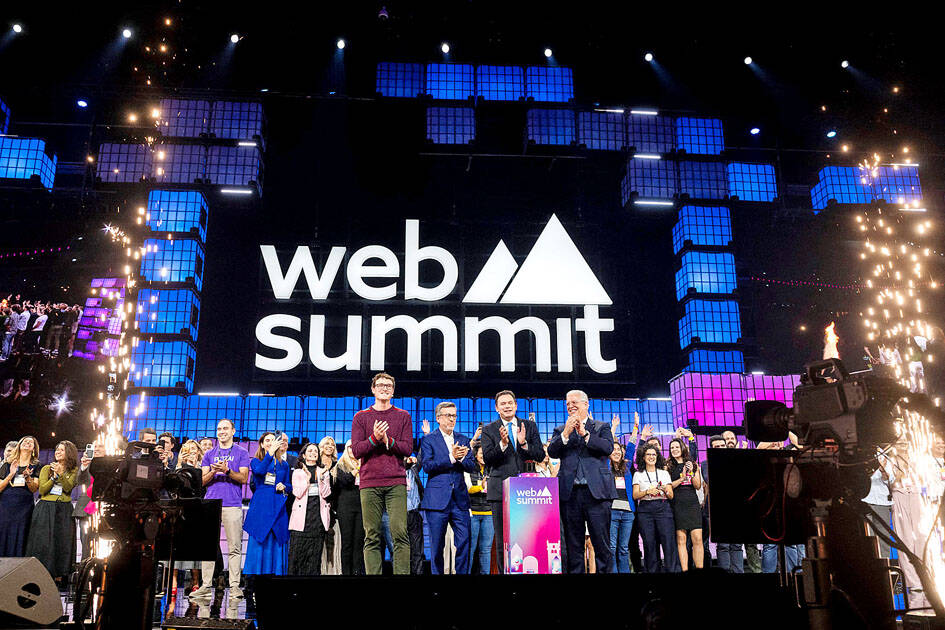Leading lights of the tech industry met in Lisbon yesterday for the Web Summit, the sector’s first big event since the US election, with Donald Trump’s victory expected to be a key theme of their discussions.
The tech industry is holding its breath to see what Trump’s second term will bring when he takes over in January, especially as Space Exploration Technologies Corp (SpaceX) and Tesla Inc chief executive officer Elon Musk is expected to have a huge influence on the next US government.
During Trump’s last term from 2017 to 2021, big tech firms were often at odds with the president, particularly given his crackdown on immigration and ramping up the trade war with China.

Photo: Patricia De Melo Moreira
The Web Summit runs until tomorrow with some 3,000 start-ups pitching their products to 1,000 investors, and 70,000 visitors taking part in events and debates, according to the organizers.
Thousands poured through the doors on the first full day of the event, delegates from countries and local governments manning pavilions with splashy slogans and sleek logos, flanked by banks of stands devoted to start-ups.
Among yesterday’s high-profile speakers was Cristiano Amon, boss of chip giant Qualcomm Inc, who played down the impact of Trump’s election.
"We’ve done well globally regardless of the administration," he said in a press conference, adding that his firm also was managing to thrive in China despite the current trade war with the United States.
Ukraine, whose future depends on Western support to push back against the Russian invasion, brought 24 start-ups to the event.
"Times are very challenging," said Yana Hulak from the Ukrainian Startup Fund when asked about the ongoing war and the changes in leadership in Washington.
"The country’s priorities are in the military sector. We are trying to showcase civilian technology," she told AFP.
"We’ve got start-ups here covering sectors from education to insurance."
The event kicked off on Monday night with singer Pharrell Williams bringing star power to the proceedings.
Organizers were keen to move on from last year’s edition when a string of big firms pulled out after Web Summit chief executive Paddy Cosgrave wrote social media posts accusing Israel of war crimes in Gaza.
Cosgrave stepped down but has since returned to his post. He made no reference to the controversy in his opening speech on Monday, saying simply: "It’s good to be back."
Cosgrave stressed that the Web Summit is focused on the start-up ecosystem first and foremost. But big tech firms have returned to the gathering this year with Meta Platforms Inc, Google and others all represented.
Kuo Zhang (張闊), president of Alibaba.com (阿里巴巴國際站), took to the stage to outline the features of a new artificial intelligence-powered search engine called Accio, named after a spell in the Harry Potter series.
Microsoft Corp president Brad Smith was also on hand to extol the benefits of artificial intelligence (AI).
His firm has ploughed billions into the tech and he told the audience AI was "the next great general purpose technology."
On the other side of the debate, prominent AI critic Max Tegmark, president of the Future of Life Institute, told the event on Monday that humanity could be on the path to oblivion.
He was especially critical of the competition between nations to build ever more powerful AI.
"It’s not an arms race between the US and China, it’s a suicide race," he said.

In Italy’s storied gold-making hubs, jewelers are reworking their designs to trim gold content as they race to blunt the effect of record prices and appeal to shoppers watching their budgets. Gold prices hit a record high on Thursday, surging near US$5,600 an ounce, more than double a year ago as geopolitical concerns and jitters over trade pushed investors toward the safe-haven asset. The rally is putting undue pressure on small artisans as they face mounting demands from customers, including international brands, to produce cheaper items, from signature pieces to wedding rings, according to interviews with four independent jewelers in Italy’s main

Japanese Prime Minister Sanae Takaichi has talked up the benefits of a weaker yen in a campaign speech, adopting a tone at odds with her finance ministry, which has refused to rule out any options to counter excessive foreign exchange volatility. Takaichi later softened her stance, saying she did not have a preference for the yen’s direction. “People say the weak yen is bad right now, but for export industries, it’s a major opportunity,” Takaichi said on Saturday at a rally for Liberal Democratic Party candidate Daishiro Yamagiwa in Kanagawa Prefecture ahead of a snap election on Sunday. “Whether it’s selling food or

CONCERNS: Tech companies investing in AI businesses that purchase their products have raised questions among investors that they are artificially propping up demand Nvidia Corp chief executive officer Jensen Huang (黃仁勳) on Saturday said that the company would be participating in OpenAI’s latest funding round, describing it as potentially “the largest investment we’ve ever made.” “We will invest a great deal of money,” Huang told reporters while visiting Taipei. “I believe in OpenAI. The work that they do is incredible. They’re one of the most consequential companies of our time.” Huang did not say exactly how much Nvidia might contribute, but described the investment as “huge.” “Let Sam announce how much he’s going to raise — it’s for him to decide,” Huang said, referring to OpenAI

Nvidia Corp’s negotiations to invest as much as US$100 billion in OpenAI have broken down, the Wall Street Journal (WSJ) reported, exposing a potential rift between two of the most powerful companies in the artificial intelligence (AI) industry. The discussions stalled after some inside Nvidia expressed concerns about the transaction, the WSJ reported, citing unidentified people familiar with the deliberations. OpenAI makes the popular chatbot ChatGPT, while Nvidia dominates the market for AI processors that help develop such software. The companies announced the agreement in September last year, saying at the time that they had signed a letter of intent for a strategic